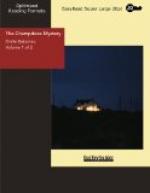This was the thunderbolt launched from the pulpit, which seemed to crush Diana into the earth, and her heart almost ceased to beat.
“Let any one,” continued the priest, “who knows of any impediment to this marriage, take warning that he or she must acquaint us with it, under the penalty of excommunication. At the same time let him be warned under the same penalty to bring forward nothing in malice or without some foundation.”
An impediment! What irony lay veiled beneath that word. Mademoiselle de Laurebourg knew of more than one. A wild desire filled her heart to start from her seat and cry out,—
“It is impossible for this marriage to take place, for that Norbert was her affianced husband in the sight of Heaven, and that he was bound to her by the strongest of all links, that of crime.”
But by a gigantic effort she controlled herself, and remained motionless, pallid as a spectre, but with a forced smile on her lips, and with unparalleled audacity made a little sign to one of her female friends, which plainly meant, “This is, indeed, something unexpected.” All her mind was concentrated to preserve a calm and unmoved aspect. The singing of the choir seemed to die away, the strong odor of the incense almost overpowered her, and she felt that unless the service soon came to an end, she must fall insensible from her chair. At last the priest turned again to the congregation and droned out the Ita missa est, and all was over. Diana grasped the arm of her maid and forced her away, without saying a word. As she reached home, a servant ran up to her with a face upon which agitation was strongly painted.
“Ah, mademoiselle,” gasped he, “such a frightful calamity. Your father and mother are expecting you; it is really too terrible.”
Diana hastened to obey the summons. Her father and mother were seated near each other, evidently in deep distress. She went towards them, and the Marquis, drawing her to him, pressed her against his heart.
“Poor child! My dear daughter!” murmured he, “you are all that is left to us now.”
Their son had died, and the sad news had been brought to the Chateau while Diana was at Mass. By her brother’s death she had succeeded to a princely fortune, and would now be one of the richest heiresses for many a mile round. Had this event happened but a week before, her marriage to Norbert would have met with no opposition from his father, and she would never have plunged into this abyss of crime. It was more than the irony of fate; it was the manifest punishment of an angry Divinity. She shed no tear for her brother’s death. Her thoughts were all firmly fixed on Norbert, and that fearful announcement made in the house of God rang still in her ears. What could be the meaning of this sudden arrangement, and why had the marriage been so suddenly decided on?




